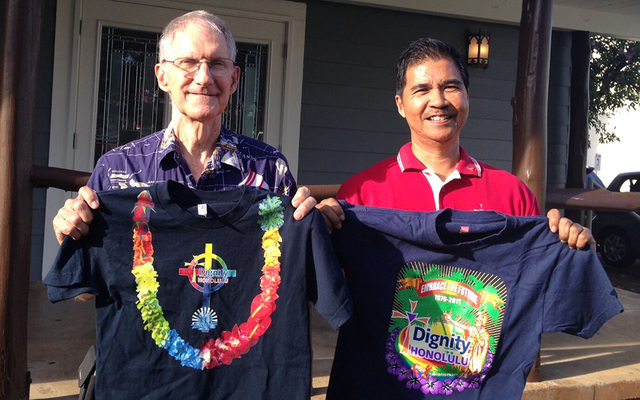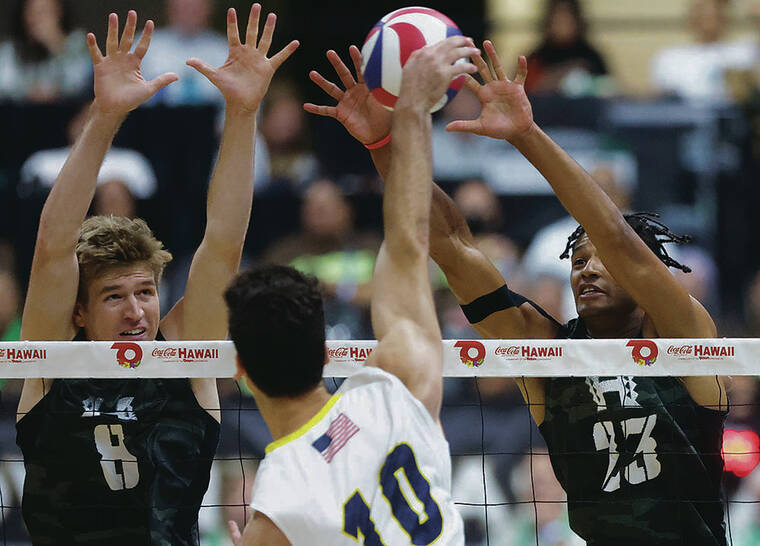Catholic group for gays marks 40 years

PAT GEE / PGEE@STARADVERTISER.COM
Jim Slatkavitz, left, and Gene Corpuz, longtime members of Dignity Honolulu, stand in front of St. Mary’s Episcopal Church, which hosts the group’s Sunday services. Members of the LGBT community can gather and worship without feeling “ostracized because of a sermon they heard,” Slatkavitz said.
Dignity Honolulu was formed in 1976 to offer support and advocate for nondiscrimination laws at a time when lesbian, gay, bisexual and transgender people were often more than a bit hesitant to declare their sexual orientation.
The small Catholic group’s longtime president Gene Corpuz called it “an act of courage to start the group because people weren’t even out then.”
Jim Slatkavitz, the only founding member still active in Dignity, said the local chapter began to take shape when about a dozen people were celebrating Mass in one another’s homes because they didn’t feel welcome in their churches. When Slatkavitz heard about the national organization Dignity USA, he thought it would be a positive influence on “Roman Catholics who were coming out” in Hawaii.
These days, Dignity Honolulu holds Sunday services in a hall at St. Mary’s Episcopal Church on King Street, where the LGBT community “can meet and sing and pray” without feeling “ostracized because of a sermon they heard, or maybe members don’t understand people who are different,” Slatkavitz said.
The chapter is celebrating its 40th anniversary today with its annual recognition dinner at The Willows restaurant. In attendance will be special guest Glen Crane, Dignity USA’s treasurer.
Corpuz, who has held leadership positions locally and nationally with Dignity since 1991, said the Hawaii chapter has testified before state lawmakers in support of civil unions, marriage equality and transgender issues. Also, it has held symbolic prayer vigils and participated in annual Pride Parade and Martin Luther King Day Parade events since 1990. The group validates LGBT relationships with special liturgies throughout the year and provides marriage officiants for same-gender weddings.
Don't miss out on what's happening!
Stay in touch with breaking news, as it happens, conveniently in your email inbox. It's FREE!
Although the Catholic Church’s stance on LGBT issues differs from his own, Corpuz said he has maintained a steady working relationship in the Roman Catholic Diocese of Honolulu since 1987 when he arrived in the islands. He has served as cantor at Sts. Peter and Paul Church as well as at the Newman Center, and sings in the diocesan choir.
Church leadership has encouraged him to be celibate, though he’s in a 25-year relationship, Corpuz said. The message he said he got was, “It’s not a sin to be homosexual if you stay celibate. In other words, it’s OK to be gay if you don’t do anything about it.” He added, “I don’t believe (in that) because it’s denying who you are.”
The church allows homosexuals full participation, except in the priesthood, provided they are celibate.
The Honolulu diocese supported legislation favoring nondiscrimination against gays in employment (citing the Hawaii Employment Practices Act of 1991), Corpuz said. It opposes marriage equality, though national surveys indicate that Catholics on the street tend to be more liberal than the hierarchy on such issues, he said.
“The church moves at a glacial pace,” he said. “Catholics and people of other religions have literally rejected their children and put them out on the street if they’re gay. So Pope Francis is saying we have to treat people with kindness, but he didn’t change church doctrine yet.”
Corpuz added, “Gay people are still being bullied. All we can do is be supportive for equality, dignity and justice, and hope the Roman Catholic Church follows in the spirit of Pope Francis, to be accepting of all people.”
In spite of the disapproval of the homosexual lifestyle, Dignity members are still Catholics because “in our hearts we know God is an all-loving God,” Slatkavitz said. “We feel kinda sad for people who may be misled or misinterpret the readings of the Bible.”
He continued, “There are so many families with gay, lesbian and transgender members. … It’s good to have an organization like Dignity and (others) to help family members get a few answers.” For Slatkavitz the group “helped to make my life more fulfilling” in that he’s able to socialize, participate in worship and receive encouragement from people contending with the same challenges.
After the passing of four decades, Slatkavitz said, there is “more openness in the (LGBT) community. … We hope to be here for a long time to bring people together.”
3 responses to “Catholic group for gays marks 40 years”
Leave a Reply
You must be logged in to post a comment.







Sick people
Roman Catholism does not take the Holy Bible (God’s Holy Word) literally. God says homosexuality is a “detestable sin.” God has not changed His mind. In the Bible, God says, I am the same yesterday, the same today and the same tomorow. I change not.”
When these Catholic homosexuals have their last breath on earth, their next breath will be in hell. Sounds cruel? God says in 1st Corinthians 6:9, homosexuals will not inherit the kingdom of God. They need to repent and depart from this sin..
Sure have been a lot of these LGBT articles lately; keep reminding me, or I might forget. Thank you.